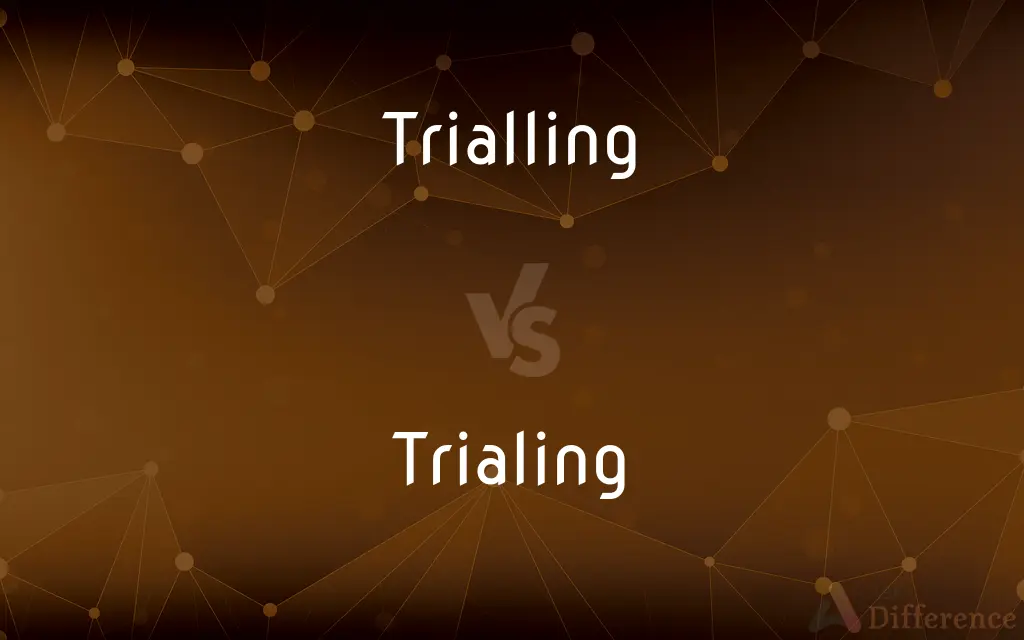Trialling vs. Trialing — What's the Difference?
By Tayyaba Rehman — Published on November 14, 2023
"Trialling" and "trialing" mean testing or trying something, with "trialling" being British English and "trialing" being American English.

Difference Between Trialling and Trialing
Table of Contents
ADVERTISEMENT
Key Differences
"Trialling" and "trialing" are two spellings that denote the process of testing or trying something out, but they diverge in their regional usage. "Trialling" is the spelling more commonly utilized in British English, for example, "The company is trialling a new software." Alternatively, "trialing" finds its use primarily in American English, illustratively, "The team is trialing a new strategy."
Both spellings, though regionally variant, communicate a similar idea: to experiment with or test something in a practical context. The concept of "trialling" might be used to describe a pharmaceutical company testing a new drug in the UK. On the opposite end, "trialing" might describe a U.S. tech company testing a new app. The core denotation stays consistent across both versions.
When discussing "trialling," it pertains to the act of conducting a trial or test and is primarily utilized in regions such as the UK or Australia. The implication when a business is "trialling" a new system implies they are in the experimental phase, gauging efficacy and utility. In a parallel sense, "trialing," rooted in American English, also navigates through the experimental and evaluative stages of a concept or product.
In professional contexts, such as scientific research or legal settings, "trialling" and "trialing" might both surface, still adhering to their respective regional uses. A British research team might be "trialling" new methods to address an issue, whereas an American team could be "trialing" innovative approaches towards a similar end. Both instances reflect a period of evaluation and analysis.
Fundamentally, "trialling" and "trialing" can be seen as two sides of the same coin, merely differentiated by regional spelling preferences. It’s crucial to align the spelling with the relevant audience or region to ensure clarity and adherence to regional linguistic norms. Thus, while the action described remains comparable, recognizing the regional appropriateness of each spelling ensures effective communication.
ADVERTISEMENT
Comparison Chart
Regional Usage
Primarily used in British English
Primarily used in American English
Example Usage
"The company is trialling a new system."
"The team is trialing a new strategy."
Common in Publications
Often seen in UK and Australian publications
Commonly seen in US publications
Lingual Preference
Preferential in regions following British English conventions
Utilized where American English conventions are followed
Contextual Application
Applied in various contexts with a British English audience
Used similarly but tailored to an American audience
Compare with Definitions
Trialling
Trialling in marketing
The brand is trialling a new advertisement strategy.
Trialing
Trialing in technology
The developer is trialing the software on various devices.
Trialling
Trialling in software development
We are trialling the beta version of the app.
Trialing
Trialing in business
The company is trialing a different management system.
Trialling
Trialling in research
The team is trialling various data collection techniques.
Trialing
Trialing in sports
The coach is trialing a new training regimen.
Trialling
Trialling in experiments
The scientist is trialling innovative methods.
Trialing
Trialing in healthcare
The hospital is trialing a new patient care approach.
Trialling
Trialling in product releases
The store is trialling a new product line.
Trialing
Trialing in academia
The professor is trialing a new teaching method.
Trialling
(British spelling) trial
Trialing
(American spelling) trial
Trialling
The process of running a trial; an experiment or pilot.
Trialling
The running of trial races, especially for horses or greyhounds.
Common Curiosities
Is "trialling" used in American publications?
No, "trialing" is commonly used in American English.
Is "trialling" a legal term?
It can be used in legal contexts but is not exclusive to them.
Can "trialling" and "trialing" be used interchangeably?
Yes, but usage should align with the respective American or British audience.
Does "trialing" find usage in British English?
"Trialling" is more commonly used in British English.
Can "trialing" pertain to product testing?
Yes, "trialing" can refer to testing products or strategies.
Is "trialling" applicable in a scientific context?
Yes, "trialling" is applicable where testing or experimenting is involved.
Does "trialling" always indicate a scientific trial?
No, "trialling" can refer to any instance of testing or trying something.
Is "trialing" relevant in a healthcare setting?
Absolutely, "trialing" can pertain to testing methods, treatments, or systems in healthcare.
Does "trialing" always imply a formal experiment?
Not always, "trialing" can denote any form of testing or trying, formally or informally.
Can "trialing" be used in a sports context?
Yes, "trialing" can refer to testing strategies or players in sports.
Is "trialling" correct in formal writing in the UK?
Yes, "trialling" is the preferred spelling in British English, including formal writing.
Can "trialling" be used in a technological context?
Yes, "trialling" can refer to testing software, systems, or gadgets.
Is "trialling" related to product development?
Certainly, "trialling" can indicate the testing phase in product development.
Is it incorrect to use "trialing" in British English contexts?
While understandable, "trialling" is generally the accepted spelling in British English.
Can "trialing" indicate testing new educational strategies?
Yes, "trialing" can refer to testing new strategies or approaches in education.
Share Your Discovery

Previous Comparison
Beside vs. Next To
Next Comparison
Winners vs. LosersAuthor Spotlight
Written by
Tayyaba RehmanTayyaba Rehman is a distinguished writer, currently serving as a primary contributor to askdifference.com. As a researcher in semantics and etymology, Tayyaba's passion for the complexity of languages and their distinctions has found a perfect home on the platform. Tayyaba delves into the intricacies of language, distinguishing between commonly confused words and phrases, thereby providing clarity for readers worldwide.
















































